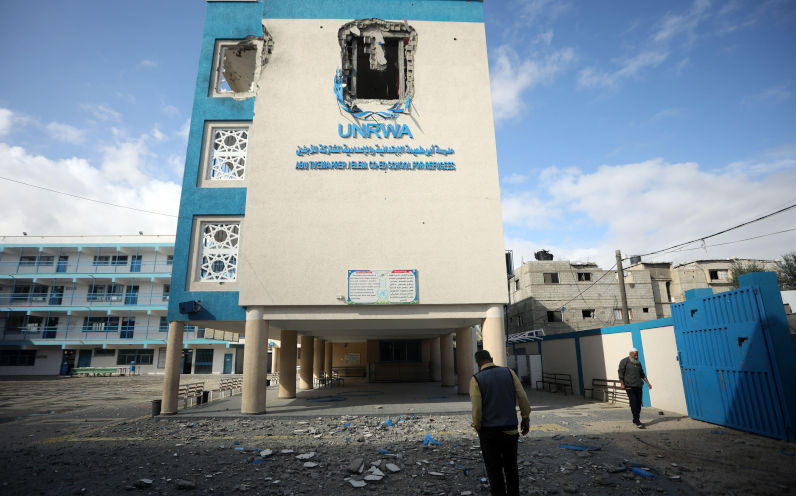UNRWA must not be criminalised by the Israeli Parliament
July 18, 2024
The conflict in Gaza has created both a humanitarian crisis and a public health emergency. Both are still worsening. Yet despite this, Israel is moving to declare UNRWA (United Nations Relief Work Agency) a terrorist organisation. This would massively reduce the ability of UNRWA to deliver (already totally inadequate) food, health care and shelter to the starving people of Gaza.
For decades the United Nations Relief Work Agency (UNRWA) has provided education, healthcare and aid to Palestinians in Gaza, the West Bank, Jordan, Lebanon and Syria. UNRWA has more than 30,000 staff across the region, including 13,000 in Gaza, the majority of them Palestinian. UNRWA is widely acknowledged as the organisation that is the backbone of aid in Gaza and the West Bank – providing essential relief for millions of Palestinian with food aid, provision of shelters, health care and support.
However, just over a week ago, the Israeli Parliament’s Foreign Affairs and Defence Committee unanimously approved three bills that criminalise UNRWA - the organisation, its activities and its staff. These bills, that now go back to the Knesset plenum for a first reading, designate UNRWA a terrorist organisation, forbid the UN agency from operating in Israel and strip personnel of various legal immunities afforded to United Nations staff.
Israel has long objected to UNRWA’s definition of Palestinians as refugees, and has been especially vocal against extending that category to those born in the Gaza Strip. Israel accused 19 members of UNRWA of having taken part in the appalling October 7 Hamas-led attacks in southern Israel, that killed an estimated 1,200 people and 252 Israelis and foreigners were taken hostage. An independent review in April found that Israel has not as yet presented credible evidence for its claims.
Since October 7, over 100,000 people have been killed or maimed in Gaza. By the end of May, around 60 percent of all buildings, including dwellings, shops and infrastructure, such as hospitals and schools; and nearly 70 percent of water, sanitation and hygiene facilities across the Gaza Strip were damaged or destroyed.
On July 14, Scott Anderson, Director of UNRWA Affairs in Gaza said,
“Visiting the Nasser Medical Complex in Khan Younis yesterday, I witnessed some of the most horrific scenes I have seen in my nine months in Gaza…With not enough beds, hygiene equipment, sheeting, or scrubs, many patients were treated on the ground without disinfectants…. the air was filled with the smell of blood.
I saw toddlers who are double amputees, children paralysed and unable to receive treatment, and others separated from their parents. I also saw mothers and fathers who were unsure if their children were alive.”
In June, UNRWA said 50,000 children needed urgent treatment for starvation. According to the latest UN-partnered IPC report , 96 per cent of the population – some 2.15 million people – face acute food insecurity at a “crisis” level or higher.
Adele Khor, UNICEF Regional Director for the Middle East and North Africa, said,
“Horrific images continue to emerge from Gaza of children dying before their families’ eyes due to the continued lack of food, nutrition supplies, and the destruction of healthcare services,”
Meanwhile, very few supplies are entering the enclave, and only five WHO trucks were allowed to enter in the first week of July.
Last week 11 independent UN experts, including the Special Rapporteur on the right to food and the Special Rapporteur on human rights in the occupied Palestinian territory, said,
“Israel’s intentional and targeted starvation campaign against the Palestinian people is a form of genocidal violence and has resulted in famine across all of Gaza,”
They called on the international community to prioritise the delivery of humanitarian aid by land by any means necessary, end Israel’s siege, and establish a ceasefire.
According to Médecins Sans Frontières (MSF) Secretary General Christopher Lockyear in May:
“The Israeli Knesset’s preliminary bill to designate UNRWA as a terrorist organisation is an outrageous attack on humanitarian assistance and an act of collective punishment against the Palestinian people. We strongly condemn the proposed designation and stand in solidarity with UNRWA… “
He went on to say:
“This follows months of intimidation against UNRWA, including an attack on its offices in Jerusalem. It is the culmination of the continuous systematic obstruction of vital humanitarian aid, including into the Strip, effectively choking Gaza. This occurs while Israeli forces continue attacking populated areas resulting in mass civilian casualties in areas designated as ‘safe zones’ by Israeli forces, continue with the destruction of civilian infrastructures including hospitals, and with the repeated forced displacement of hundreds of thousands of people trapped in Gaza.
…if the bill passes a final reading, it (UNRWA) will also be criminalised under Israel’s Anti-Terrorism Law, in contradiction with international humanitarian law. This would have terrible consequences as it could amount to a free license to attack UNRWA facilities and its humanitarian personnel and would further endanger civilians seeking the protection of the UN Agency.”
A permanent ceasefire, with release of Israeli hostages and Palestinian detainees, is clearly a critical and urgent necessity. But regardless of when that occurs, supporting UNRWA as the organisation most able to provide aid is essential.
Current levels of aid must massively increase. Collective punishment of a whole population by starvation is a war crime.
The Australian government needs to speak out loudly against the Israeli Parliament’s proposed criminalisation of UNRWA and use whatever influence it has to enable continuation of its life saving work.
Humanitarian workers must not be attacked, and civilians must be protected at all times.
